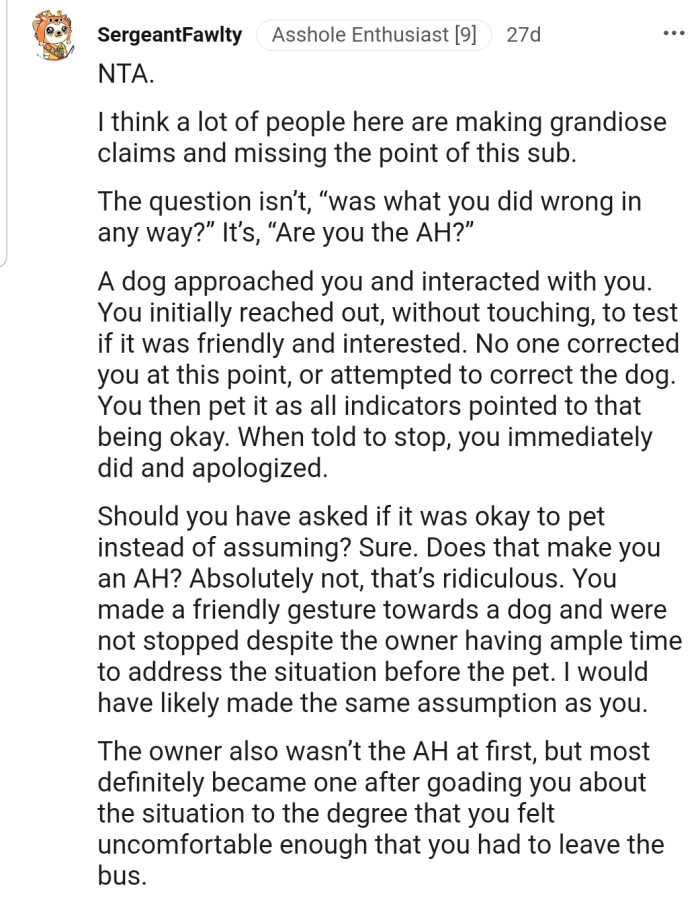Reddit User Accidentally Ignites Firestorm After Petting A Stranger's Emotional Support Dog
You know, life has a way of catching you off guard with unexpected lessons, and this story is one such lesson delivered in the most peculiar way.
It was one of those bizarre days where routine had given way to change — our narrator (Original Poster) was forced to abandon their comfortable home office due to a pesky internet outage.
What lay ahead was an unexpected journey involving a public bus, an incredibly charming golden retriever, and a contentious encounter with its owner that left OP stunned.
OP has always been a dog lover; these creatures invoke an indomitable joy in them, akin to the bright and innocent glee of a child seeing a rainbow for the first time. OP's encounter with a beautiful golden retriever on the bus started innocently — a playful nuzzle, a wag of the tail, and an outstretched hand.
Little did they know that their gesture of kindness would trigger an emotional explosion from the dog's owner, an outcry that left them questioning how to interact with dogs, especially those with a unique, critical role to play in their owners' lives.
Was it a simple act of love towards this furry critter or an uncalled-for intrusion into someone else's emotional comfort zone?
Scroll down to find out the full details of this intriguing story.
The Story in Detail

OP Decided to Pet a Stranger's Emotional Support Dog on a Bus After the Furry Ball Came to Them, and Now the Owner is Having a Meltdown

Even After Two Apologies, the Woman Kept Bashing OP and Even Started Crying. OP Had No Other Option but to Get Off the Bus

Understanding Emotional Triggers
Dr. Sarah Thompson, a clinical psychologist, explains that emotional triggers often stem from past experiences that create heightened sensitivity.
When individuals perceive a threat to their emotional state, it can lead to intense reactions, even in seemingly benign situations.
Research published in Psychological Science supports the idea that unresolved emotional issues can manifest in disproportionate responses to stressors.
Understanding Emotional Support Animals
The emotional support animal (ESA) phenomenon reflects a deep-seated need for comfort and companionship in stressful situations. According to Dr. Melissa Hart, a psychologist specializing in human-animal interactions, ESAs can provide significant emotional benefits, but their presence also comes with responsibilities.
Research indicates that individuals who rely on ESAs often experience heightened emotional responses when they perceive threats to their bond with the animal. In the case of the Reddit user, this reaction may stem from a perceived lack of respect or recognition of the animal's emotional significance.
The post garnered 4.2k upvotes and almost 2k comments. Let's take a look at what the Reddit community had to say about this:
"The Owner Wasn’t the AH at First, but Most Definitely Became One After Goading You to the Degree That You Had to Leave the Bus."

"ESH... She Needs to Learn What Sit, Stay, and Heel Mean... You Because You Shouldn't Be Petting Anyone's Dog Without Permission."

"I Think the Person Needs More Emotional Support Than What the Dog Can Provide."

The incident involving the emotional support dog highlights the complexities of human-animal relationships.
Studies indicate that emotional support animals can provide significant psychological benefits, but they can also lead to conflicts when boundaries are unclear.
Understanding the psychological basis for these dynamics can help individuals navigate such conflicts more effectively.
Understanding the emotional dynamics at play can help clarify why encounters with ESAs can become contentious. A study published in the Journal of Emotional Support Animals found that individuals with strong emotional ties to their animals often exhibit heightened sensitivity to perceived threats to their relationship. This heightened response can lead to conflict, particularly in public settings where boundaries are more ambiguous.
Open communication regarding the role of the ESA in one's life can help alleviate misunderstandings and foster a more respectful interaction between pet owners and the public.
"It Is More Polite to Ask, but I Don't See Anything Wrong with What You Wrote."

"NTA - If You Had Gone Over to the Dog, I'd Say It Was Your Fault."

"The Woman is the A**hole in This Story, Getting Upset When They Themselves Aren’t Even Watching and Letting It Randomly Approach People."

Navigating Emotional Responses
When confronted with intense emotional reactions, it's important to practice emotional regulation techniques. Experts recommend mindfulness and grounding exercises to manage overwhelming feelings.
Research shows that individuals who engage in mindfulness practice report lower levels of emotional reactivity and improved coping skills.
Simple techniques, such as focusing on one's breath or engaging in sensory activities, can help individuals regain composure during emotionally charged situations.
Navigating Public Spaces with ESAs
Interacting with others in public spaces while accompanied by an ESA requires a delicate balance of empathy and assertiveness. Dr. Karen McDonald, a social psychologist, emphasizes the importance of educating the public about the rights and needs of individuals with ESAs. Research shows that increased awareness can reduce stigma and promote understanding in community settings.
Pet owners should be prepared to explain their animal's role in their emotional well-being, which can facilitate more positive interactions. This proactive approach can help others feel more comfortable and reduce potential conflicts.
"If the Owner Doesn’t Want People Petting Their Dog, It’s Their Responsibility to Keep Their Dog from Approaching People."

"The Best Thing You Did Was Apologize, Although She’s Allowing Her Dog to Interact with People and Then Getting Upset About It."

In a society brimming with unseen boundaries and undisclosed signs, OP's encounter is a stark reminder of the friction we may encounter in our daily interactions with other people.
OP's well-intentioned gesture towards the golden retriever had unforeseen consequences, leaving them riddled with guilt and self-doubt. However, they can draw strength from the fact that most of the Reddit community is on their side.
We'd love to get your thoughts on this story. Do you think it was wrong for OP to pet someone's emotional support dog without permission, even though it approached them first, or do you think the owner overreacted?
In situations where misunderstandings arise, employing conflict resolution strategies is beneficial. Techniques such as active listening and expressing one’s feelings can help de-escalate tensions. According to Dr. John Gottman, a renowned marriage researcher, “The ability to listen actively and validate feelings is crucial in resolving conflicts and fostering understanding.” His research emphasizes that individuals who engage in active listening are better equipped to navigate emotional disputes. Ultimately, a combination of education and empathy can create a more harmonious environment for everyone involved.
Psychological Analysis
This scenario illustrates the emotional intensity that often accompanies interactions involving emotional support animals. It's essential for both parties to approach these situations with empathy and understanding, ensuring that the emotional needs of the ESA owner are acknowledged while maintaining public space etiquette.
Analysis generated by AI
Analysis & Alternative Approaches
The complexities surrounding emotional support animals highlight the need for understanding and communication in public interactions. Education about the role and importance of ESAs can foster a more respectful atmosphere for both pet owners and the community.
Furthermore, developing self-awareness around emotional triggers can facilitate healthier interactions.
Psychologists suggest keeping a journal to identify patterns in emotional responses, which can lead to greater insight and emotional intelligence over time.
Building this self-awareness can empower individuals to respond more thoughtfully rather than reactively in future encounters.
Psychological Analysis
This incident illustrates how emotional triggers can lead to intense reactions, often rooted in past experiences and unresolved issues.
Recognizing these patterns is the first step toward developing healthier responses and improving interpersonal interactions.
Analysis generated by AI
Analysis & Alternative Approaches
Understanding the psychological dynamics at play in emotionally charged situations is crucial for personal growth and relationship management.
According to Dr. Daniel Goleman, an emotional intelligence expert, "The ability to manage emotions is essential for both personal and professional success." Learning to regulate emotional responses is a key component of emotional intelligence.
By fostering self-awareness and practicing coping strategies, individuals can navigate their emotional landscape with greater ease and confidence.



